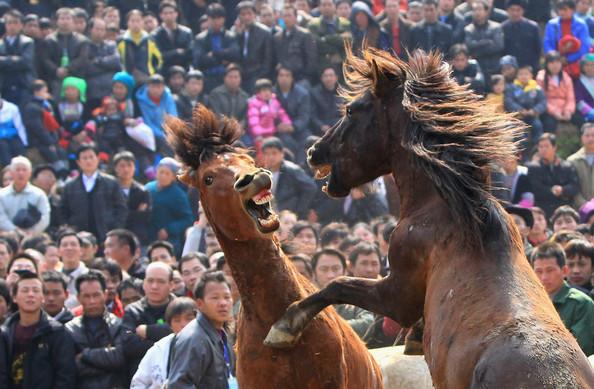Traditions - Pig, horse and water buffalo fights

In some Asian countries such as China and the Philippines, pig and horse fights are considered as part of local tradition and, in spite of animal right organizations’ protests and petitions from all over the world, year after year hundreds of people keep attending to these cruel shows.
Horse fights occur mainly in Mindano in the south of Philippines. These animals, that usually don’t attack nor fight against each other, are brutally led to perform by presenting them a “bait” in the form of a female in heat, brought and tied in the arena. The result is a bloody battle in which the two males attack their “sexual rival” by biting and kicking each other, causing serious damages.
Horses die due to wounds, blows or exhaustion. Usually, even those who survive the fight are sacrificed as owners do not wish to spend money in veterinary cares.
The experience for the mare is equally traumatising, as she suffers the blows from the fighting males and is also forced to mate with the different winners.
Although officially those fights are illegal, corruption and lack of effective control allow this cruelty to continue to happen and even to broadcast some of the “matches” on TV. In addition to Philippines, horse fights are also organized in some areas of Indonesia, South Korea and China.
Pig fights are just as much cruel. They are mainly organized in the Chinese region of Guangxi Zhuang, where a festival dedicated to this “tradition” takes place.
These animals are also forced to fight by their “trainers”, who hit and poke them with sharp sticks. Animals crash and bang their heads into each other’s and bite their forced rivals’ neck. A fight ends only when one or both animals die. In the same region, water buffalos are also used to fight until death.
As stated above, although these performances are extremely violent, the organizers keep claiming that they are part of “a tradition” and state that they won’t stop organizing them as they represent an important part of the local culture.
